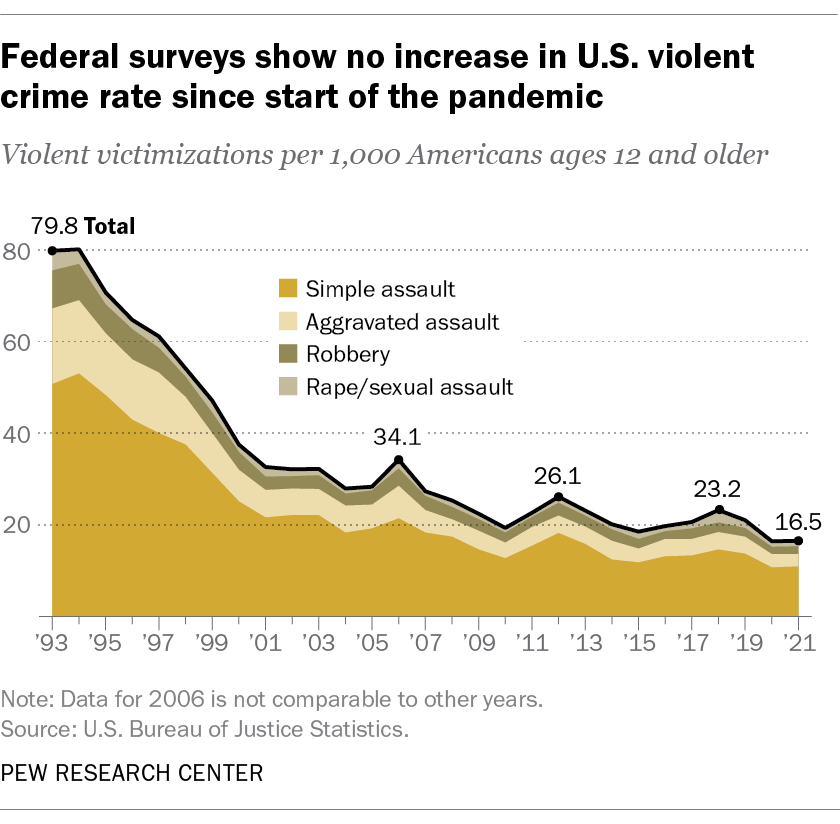
In Vox, Journalist Abdallah Fayyad offers theories on why politicians from both parties have sounded the alarm about rising crime.
THE TRUTH
In truth, the pandemic-era spike in crime actually seems to have subsided. The first three months of 2024 showed a historic decline in crime rates compared with the same period last year, according to the latest data from the FBI. Murder, for example, is down 26 percent, and robberies dropped 18 percent. Crime rates now look more like they did pre-Covid, steadily declining as they had been since the 1990s.
And yet, the majority of Americans still believe that crime is only getting worse. A 2023 Gallup poll showed that 77 percent of Americans believed that crime was increasing across the country. That might help explain why lawmakers have been overreacting to the short-lived rise. Many take a tough-on-crime approach to public safety. Their measures include imposing harsher penalties and increasing police surveillance.
So what could be driving the big, consistent gap between public perception and reality? Here are three theories:
1. FEARMONGERING CAUSED BY POLITICIANS
For decades, American politicians — and especially Republicans — have run political campaigns that put crime front and center, even when crime rates are on the decline. This style of campaigning dates back to the 1960s, when Arizona Sen. Barry Goldwater launched a “law-and-order” presidential campaign against Lyndon Johnson and used crime as a way to implicitly talk about race.
Republican presidents like Richard Nixon, George H. W. Bush, and Donald Trump all focused on urban crime as a way to stir up white suburban voters in particular. National media — especially opinion and commentary publications — also took the theory and ran with it. According to the Marshall Project, the country’s leading newspapers and magazines used the term “superpredator” nearly 300 times between 1995 and 2000, when crime had started to decline. The majority of times, the term was used uncritically.
“It’s a vicious cycle . . . There’s a latent concern about crime — it always sits there as a second-tier issue for voters. And if you play upon that as a politician, and you campaign and you really spark fear around the issue, you watch it grow as a top voting issue. That’s absolutely what happens.” ~Insha Rahman, vice president of advocacy and partnerships at the Vera Institute of Justice.
2. MEDIA COVERAGE OF CRIME DISTORTS REALITY
Media outlets dedicate entire sections to coverage of crime, making it a significant part of Americans’ news digest. Its constant coverage makes people feel like it’s a problem that never subsides. Today, there’s also the added layer of social media.
3. WHEN CRIME IS SENSATIONALIZED, AMERICANS CAN’T LOOK AWAY.
According to journalist Abdallah Fayyad, when crimes that might be relatively rare are given outsized weight in the media, people start to believe that they’re more common than they actually are. It also leads to a vicious feedback loop. Tough-on-crime politicians repeatedly talk about a case, media outlets cover it, and people become extremely interested in it. This encourages politicians to continue exploiting the case and more media coverage.
Take the case of Laken Riley, a 22-year-old nursing student who was killed earlier this year. The story played into Republicans’ narrative about immigration — Trump started his 2016 campaign talking about how people crossing the southern borders were criminals and rapists — because the alleged killer had entered the United States illegally. The case became so prominently featured in Republican campaigns that President Joe Biden mentioned it in his State of the Union address, after Republican Rep. Marjorie Taylor Greene confronted him about it.
Studies show, however, that immigrants aren’t more likely to commit crimes than native-born citizens. In fact, some studies show that immigrants might be less likely to commit crimes than people born in the US. But when one horrific incident like Laken Riley’s is sensationalized, it can quickly affect public opinion: One poll, for example, showed that the majority of Americans believe that migration is leading to more crime, despite all evidence that points to the contrary.
So while law-and-order campaigns feed off sensationalizing crime, they are often actually about something else: stirring up fear of a changing society.
CRIME WILL KEEP GETTING DISCUSSED AS A 2024 CAMPAIGN ISSUE
According to journalist Abdallah Fayyad, Trump has spent a lot of time talking about crime. despite falling crime rates, and he’s likely to bring it up during his debates with Biden. Regardless of where crime rates actually stand, the fact that so many people believe that crime is not only a serious problem but one that’s actively getting worse has resulted in Republicans and Democrats trying to prove their tough-on-crime bona fides. Even officials in the Biden administration, for example, have told progressives that they went “too far” on criminal justice reforms and that they should look for a more “sensible approach.”
But whatever candidates will say about combating crime, one thing is clear: Crime isn’t actually getting worse – even if the majority of Americans think it is.
Excellent reporting by journalist Abdallah Fayyad. Please contact my office if you, a friend or family member are charged with a crime. Hiring an effective and competent defense attorney is the first and best step toward justice.






